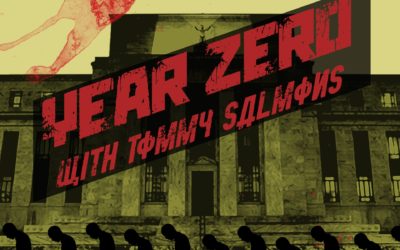I’ve been reviewing David Friedman’s The Machinery of Freedom for an upcoming article. I want to think about how Libertarian ideas for decentralized law could be applied in the realm of international politics. One thing that strikes me whenever I read about these ideas is what a humane vision of law they present.
Libertarian “anarcho-capitalist” law supposes that firms in a free market can give consumers access to safety and justice services in the absence of a monopoly state. Most of the thought experiments in this vein suppose that justice will come in the form of economic compensation. This justice will be delivered, as one imagines the market might, in the most efficient and balanced way. The result might be justice that is very different then what we know it now to be.
For instance, a life-sentence murderer (if such sentences exist), might pay more money to get a more comfortable prison environment. This seems ridiculous to contemporary ears, but if such could be the case, the guilty party may be much more willing to confess and speed up the legal process and effect the best justice.
What sort of justice would that be? Could a wealthy murderer be made to make a large donation to a firm that treats emotional and psychological problems in individuals who have potential to commit violent crimes?
As far as I see it, moral justice belongs to God, not man. As such, there are only two practicable and justifiable modes of justice which man ought to employ. Compensatory justice: theft equals repayment with interest and fees. Preventative justice: an arbitration court hears the argument of a psychologist who uses peer-reviewed science to prove that a certain punishment is sufficient to deter a certain percentage of future criminals, which could become precedent until someone comes in with new data.
The mode of justice employed by the state seems to be the following: punitive justice. This is the principle that violations of law – which itself comes by fiat from the state – represents disobedience or disloyalty to the state. Transgressors must be punished, not to restore (justice) what was lost, but for their treason against righteous authority. My personal opinion is that dualistic moral and spiritual norms from the near East embedded themselves into Western law, creating a notion of discrete good and evil, the state then appropriating the role of the agent of good must physically defeat those who transgress against it in order to restore moral balance to the cosmos. It’s the way of Marduk the Cosmic Conqueror (coming to a Marvel-friendly multiplex near you).
Why do people have to be punished? I want safety and property security. I want compensation if these are transgressed. I imagine actual, proven norms that deter towards these ends might also be valid. But punishment?
It recalls the stern Calvinist minister, the firebrand Catholic feudal lord in his quest against the Pagan Saxons, the Muslim Jihadi, or the Prince of Persia upon his chariot. It also reminds me of this:
” ‘Chimp leader assassinated by gang of underlings,’ read the headline last year in New Scientist. It told the story of Pimu, who led his cohort of chimpanzees until a violent day in March last year when Pimu picked the wrong fight. Four chimpanzees appeared out of nowhere, according to New Scientist, and beat Pimu to death with their hands and feet. It was a grisly end for a species that, along with humans, are among the only animals to coordinate attacks on their own kind.” (WashPo)
When I think of American justice, I don’t think of Cotton Mather or the Masters of Cotton: I think of Scrooge McDuck. If you watch the old “DuckTales” cartoon, you’ll notice a formula. Scrooge will be drawn to some treasure, he’ll compete to claim it with a challenging adversary, and in the end they’ll handshake on a mutually-beneficial business deal that might have nothing to do with the treasure. It’s wonderful.
I personally believe that a free market of law would handle disputes much more in the manner of Scrooge McDuck, rather than that of Pimu.




